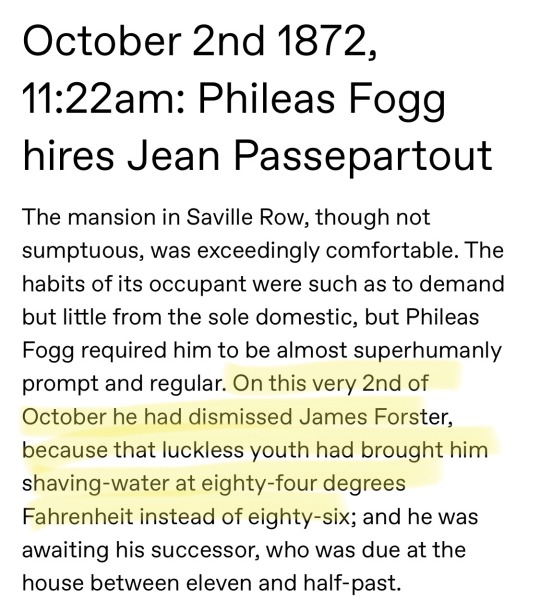#around the world in 80 dailies
Text
Meet Phileas Fogg
Mr. Phileas Fogg lived, in 1872, at No. 7, Saville Row, Burlington Gardens, the house in which Sheridan died in 1814. He was one of the most noticeable members of the Reform Club, though he seemed always to avoid attracting attention; an enigmatical personage, about whom little was known, except that he was a polished man of the world. People said that he resembled Byron—at least that his head was Byronic; but he was a bearded, tranquil Byron, who might live on a thousand years without growing old.
Certainly an Englishman, it was more doubtful whether Phileas Fogg was a Londoner. He was never seen on ’Change, nor at the Bank, nor in the counting-rooms of the “City”; no ships ever came into London docks of which he was the owner; he had no public employment; he had never been entered at any of the Inns of Court, either at the Temple, or Lincoln’s Inn, or Gray’s Inn; nor had his voice ever resounded in the Court of Chancery, or in the Exchequer, or the Queen’s Bench, or the Ecclesiastical Courts. He certainly was not a manufacturer; nor was he a merchant or a gentleman farmer. His name was strange to the scientific and learned societies, and he never was known to take part in the sage deliberations of the Royal Institution or the London Institution, the Artisan’s Association, or the Institution of Arts and Sciences. He belonged, in fact, to none of the numerous societies which swarm in the English capital, from the Harmonic to that of the Entomologists, founded mainly for the purpose of abolishing pernicious insects.
Phileas Fogg was a member of the Reform, and that was all.
The way in which he got admission to this exclusive club was simple enough.
He was recommended by the Barings, with whom he had an open credit. His cheques were regularly paid at sight from his account current, which was always flush.
Was Phileas Fogg rich? Undoubtedly. But those who knew him best could not imagine how he had made his fortune, and Mr. Fogg was the last person to whom to apply for the information. He was not lavish, nor, on the contrary, avaricious; for, whenever he knew that money was needed for a noble, useful, or benevolent purpose, he supplied it quietly and sometimes anonymously. He was, in short, the least communicative of men. He talked very little, and seemed all the more mysterious for his taciturn manner. His daily habits were quite open to observation; but whatever he did was so exactly the same thing that he had always done before, that the wits of the curious were fairly puzzled.
Had he travelled? It was likely, for no one seemed to know the world more familiarly; there was no spot so secluded that he did not appear to have an intimate acquaintance with it. He often corrected, with a few clear words, the thousand conjectures advanced by members of the club as to lost and unheard-of travellers, pointing out the true probabilities, and seeming as if gifted with a sort of second sight, so often did events justify his predictions. He must have travelled everywhere, at least in the spirit.
It was at least certain that Phileas Fogg had not absented himself from London for many years. Those who were honoured by a better acquaintance with him than the rest, declared that nobody could pretend to have ever seen him anywhere else. His sole pastimes were reading the papers and playing whist. He often won at this game, which, as a silent one, harmonised with his nature; but his winnings never went into his purse, being reserved as a fund for his charities. Mr. Fogg played, not to win, but for the sake of playing. The game was in his eyes a contest, a struggle with a difficulty, yet a motionless, unwearying struggle, congenial to his tastes.
Phileas Fogg was not known to have either wife or children, which may happen to the most honest people; either relatives or near friends, which is certainly more unusual. He lived alone in his house in Saville Row, whither none penetrated. A single domestic sufficed to serve him. He breakfasted and dined at the club, at hours mathematically fixed, in the same room, at the same table, never taking his meals with other members, much less bringing a guest with him; and went home at exactly midnight, only to retire at once to bed. He never used the cosy chambers which the Reform provides for its favoured members. He passed ten hours out of the twenty-four in Saville Row, either in sleeping or making his toilet. When he chose to take a walk it was with a regular step in the entrance hall with its mosaic flooring, or in the circular gallery with its dome supported by twenty red porphyry Ionic columns, and illumined by blue painted windows. When he breakfasted or dined all the resources of the club—its kitchens and pantries, its buttery and dairy—aided to crowd his table with their most succulent stores; he was served by the gravest waiters, in dress coats, and shoes with swan-skin soles, who proffered the viands in special porcelain, and on the finest linen; club decanters, of a lost mould, contained his sherry, his port, and his cinnamon-spiced claret; while his beverages were refreshingly cooled with ice, brought at great cost from the American lakes.
If to live in this style is to be eccentric, it must be confessed that there is something good in eccentricity.
He appeared to be a man about forty years of age, with fine, handsome features, and a tall, well-shaped figure; his hair and whiskers were light, his forehead compact and unwrinkled, his face rather pale, his teeth magnificent. His countenance possessed in the highest degree what physiognomists call “repose in action,” a quality of those who act rather than talk. Calm and phlegmatic, with a clear eye, Mr. Fogg seemed a perfect type of that English composure which Angelica Kauffmann has so skilfully represented on canvas. Seen in the various phases of his daily life, he gave the idea of being perfectly well-balanced, as exactly regulated as a Leroy chronometer. Phileas Fogg was, indeed, exactitude personified, and this was betrayed even in the expression of his very hands and feet; for in men, as well as in animals, the limbs themselves are expressive of the passions.
He was so exact that he was never in a hurry, was always ready, and was economical alike of his steps and his motions. He never took one step too many, and always went to his destination by the shortest cut; he made no superfluous gestures, and was never seen to be moved or agitated. He was the most deliberate person in the world, yet always reached his destination at the exact moment.
He lived alone, and, so to speak, outside of every social relation; and as he knew that in this world account must be taken of friction, and that friction retards, he never rubbed against anybody.
134 notes
·
View notes
Text

69 notes
·
View notes
Text
Around the World in 80 Days is so funny to me right now. It's like
Hello, here is a man who has spent his entire existence swapping between three spots and never ever changing. This man said 'part of being an adult is choosing what to have for dinner every day for the rest of your life?' and he made ONE DECISION and stuck with it for the rest of his life
and he's so ride or die for THIS ONE NEWSPAPER that when his friends are like 'huh, I think they've lowballed the time on that trip' he PACKS UP EVERYTHING and just disappears???
What must that have been like for his mates at the club? What must it be like to be his friend? Your one pal who never does anything adventurous who has the same cheese and ham sandwich every day and rotates between his house and the casino is suddenly like oh yeah I'm going to America and Italy and India. We're in the middle of nowhere so I'm dropping $8000 on an Uber for the four of us. Gonna buy an elephant and sell it two days later. And then he gets on a boat and does a mutiny???? Like?????
And I don't know how the story ends but imagine this. Imagine being Passepartout and meeting this guy, and THAT SAME DAY being dragged off on a wild adventure with this guy who has no budget and no scruples, and then getting home and just??? Going back to his normal 'wake up go to the club and stay there until midnight' routine?
9 notes
·
View notes
Text
Time isn’t a social construct or a celestial one. Time is a construct of Jean Passeportout’s watch
15 notes
·
View notes
Text
So Phileas Fogg wears a beard

And he’s fired his old servant because the shaving water provided was too warm.

So why would he even need shaving water if he has a beard. Unless…
Oh. Oh my.
So that’s who all those manscaping ads have been for
11 notes
·
View notes
Text
I heard Phileas Fogg has an 8 pack, I heard Phileas Fogg was shredded
7 notes
·
View notes
Text
Tumblr Book Clubs I am Currently Following, in order of how hard I think they would be to catch up on if you wanted to join the fun:
Around the World Hourly (Around the World in Eighty Days with entries sent according to the in-story hour of events, started Oct 2)
The Public Domain Book Club (started Frankenstein for the month of October on Oct 1)
Lord of the Rings Newsletter (started late September with some very long posts, but will be variable length as they follow the dates of events in the story)
Dracula Daily via Re:Dracula (chronological Dracula by Bram Stoker - OK, you've missed most of this one, but the audio format is very engaging - you could still catch up for the exciting conclusion!)
My Dear Wormwood (The Screwtape Letters by CS Lewis - 22 short letters so far, posted on a weekly basis)
What Manner of Man (original vampire romance by St John Starling - 24 shortish and very fun chapters so far, posted on a weekly basis)
Whale Weekly (Moby Dick by Herman Melville with roughly chronological timescale - we're 70-some chapters in but there are often long breaks between them so you could probably catch up)
Les Mis Letters (a chapter of Les Miserables by Victor Hugo every day for a year - catch-up difficulty level: impossible)
Please add your own!
#dracula daily#whale weekly#moby dick#dracula#around the world hourly#around the world in 80 days#jules verne#frankenstein#mary shelley#re: dracula#bram stoker#herman melville#lotr newsletter#lord of the rings#jrr tolkien#my dear wormwood#the screwtape letters#cs lewis#what manner of man#st john starling#stjohnstarling#les mis#les mis letters#les miserables#victor hugo#tumblr book club#join the chaos#the public domain book club
189 notes
·
View notes
Text
#dracula daily#where in the world is jonathan harker#I hear Around the World in 80 Days is nice this time of year
66 notes
·
View notes
Text
It's funny to me that I show up once a month or so, spam things from my drafts and likes that have been there for quite a while, and then I vanish back into the void of graduate school and work. (Two months left. Somehow.)
Hope everyone here is doing well, as best they can. Rooting for you all.
#Satari rambles#Not much else to say really#Just really hoping for the best for everyone right now#Between daily stress and being heartbroken over world events and just life#It's naive but man I just want to keep hoping somehow#Sorry I don't talk much about non-fandom things on here#Tend to keep it separate nowadays#But yeah#Hope everyone here is well#Thanks for sticking around with this ghost of a person even if I'm not offering much#Hoping to write more soon once the thesis wraps up#Almost at the 60 page minimum with 80 being the max so#Woooo#Really though thank you
6 notes
·
View notes
Text
Welcome! Welcome!
Today we have met inexplicable extraordinaire Phileas Fogg, and the plot itself will start tomorrow. Some notes that might be of interest moving forward:
Someone suggested the tag #Around The World In 80 Dailies and I think it is a great idea for any discussion/meme posts you might want to make as we read along. Otherwise #Around the World in 80 Days and #Around the World with Philly Fogg and even #ATWI80D are good too!
As this blog posts both book text posts and short travel updates, it will be the case sometimes that you will get a travel update before the book text post that explains it. Travel log posts will be tagged #travel log if you'd rather not see them.
Book text posts will generally appear between mid morning and midday, western European time; travel log posts will be posted at the exact time they happen in whatever local time it is, as approximately as I could make them to 1870's timezones (no daylight savings or timezone extensions, so it might not fit exactly with the official time nowadays in those places.).
On a few days, such as tomorrow, where there is a significant amount of text to be read, I have made my best to split it into more than one post (so the description of a character or an unconnected ramble by Verne separate from the main action are in separate posts), to make the reading experience a bit lighter.
The inbox is open to any suggestions/questions you might have, and thank you for joining!
#Around the world in 80 days#around the world in 80 dailies#ATWI80D#Book club#Tumblr Book club#books and libraries#jules verne
57 notes
·
View notes
Text

1872 Around the World in 80 Days 🤝 1897 Dracula
Namedropping the Bradshaw's
#around the world with philly fogg#around the world in 80 dailies#around the world in 80 days#dracula#dracula daily#it really was a travel essential huh
29 notes
·
View notes
Text
Seward’s treatment of Renfield, May 25 (TW: Psychiatric Abuse)
In his May 25th journal, Seward reports that he questioned Renfield more fully than he ever had before, cruelly keeping Renfield on the point of his madness. (And that he feels like he crossed a line and he’s keeping the journal in part to record his own behavior.)
But, it’s important to note that journalist Nellie Bly went undercover, getting herself committed to an asylum by acting as if she were mad, then, once she was in the asylum, acting her normal self. Her normal behavior was interpreted by the asylum doctors as signs of madness and she was incarcerated for ten days until the newspaper she worked for got her released.
The exposé was published as a book, Ten Days In A Mad-House, in 1887. This is likely something Stoker would have been familiar with. Bly revealed that the treatment of psychiatric patients in an asylum involved beatings, neglect, unsanitary conditions, and spoiled and rotten food.
Seward’s cruel questioning of Renfield, and his treatment of inmates later in the book, is set against the reality of psychiatric hospitals of the Victorian era. The idea that patients shouldn’t be beaten, given rotten food, and left to wallow in their own filth was still fairly new. Seward’s treatment of his patients makes him practically a reformer.
#dracula daily#nellie bly#does anyone remember the show Voyagers?#they did an episode about Nellie Bly's other big thing she was remembered for#going around the world in 80 days#Julia Duffy from Newhart played Nellie
118 notes
·
View notes
Text
Phileas Fogg is hot confirmed

9 notes
·
View notes
Text
ppl talking about having all kinds of classics done dracula daily style but the only one i can think of that has specific dates that can be posted by day is 'Around the World in 80 Days'... which is like 99% about the day-count if that isnt obvious from the title
89 notes
·
View notes
Text
Is anyone doing a serialized email of Around the World in 80 Days?
#dracula daily#around the world in eighty days#around the world in 80 days#jekyll and hyde weekly#jules verne
10 notes
·
View notes
Text
A Victorian passport
Bradshaw's advertised protective covers.
3 notes
·
View notes